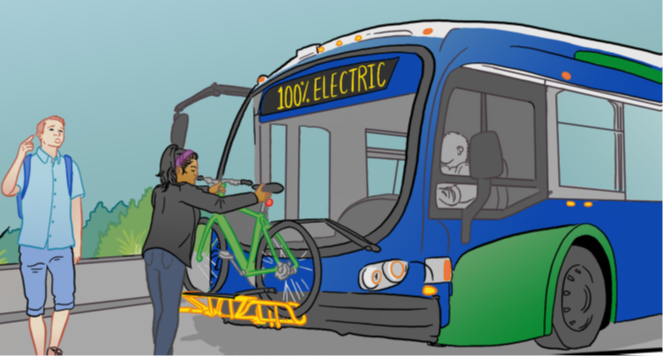Recharge for Rights this Earth Day: Time for Canada to take a climate justice approach to transportation
Guest blog by Eric Doherty, member of AI Canada’s Corporate Accountability and Climate Justice specialized team on Energy Transition. To join, please send an email to Elena: edumitru@amnesty.ca and indicate your interest in the Energy Transition team.
Last month the U.S. Department of Transportation put a Texas highway expansion project on hold, because it could violate U.S. human rights law by increasing pollution and displacing people from their homes in lower income Black and Latino neighbourhoods. And, after some intense campaigning by climate justice organizations like the Sunrise Movement, under the Biden administration, U.S. transportation spending is finally being shifted away from highway expansion and toward public transit.
Now Canada’s government is lagging far behind our southern neighbours in considering the local and global human rights implications of transportation policy and spending.
The urgency of the climate crisis demands bold action that sacrifices neither people nor the planet. Climate change is not only the great environmental emergency of our time, but also an unprecedented human rights crisis. It threatens a wide range of human rights, including the rights to water, to health, and to life itself.
Transportation is the second largest source of greenhouse gas (GHG) pollution in Canada, and emissions have been climbing relentlessly. Globally, GHG pollution from transport has more than doubled since 1970 and is increasing at a faster rate than any other energy end-use sector.
Local air pollution from transportation is also a crucial human right issue in Canada and around the world. The United Nations Special Rapporteur on human rights and the environment recognizes the “right to breathe clean air” as part of the right to health. Amnesty International calls on Canada to join other countries and recognize the right to a healthy environment. Amnesty also recently signed this joint letter calling on the UN Human Rights Council to recognize this as a fundamental right.
One of the key measures that governments must take to tackle the climate crisis and reduce local air pollution is to urgently prioritize the transition from fossil fuel powered vehicles to electric vehicles. But just shifting to electric cars isn’t a sufficient response to the climate crisis.
There are about 1.3 billion cars in operation globally, and the manufacturing of automobiles of all types, including electric vehicles, is still mainly powered with climate-disrupting fossil fuels. And the concrete and steel used to build parking structures and urban highways also have a massive greenhouse gas footprint. If the rapid increases in the number of vehicles in Canada and globally were to continue, the climate impact would be catastrophic.
Instead, governments must implement policies to reduce reliance on car travel and the number of cars on the road while quickly ending sales of new fossil fuel vehicles. The number of cars needs to shrink to make the rapid transition to electric cars practical and just. The battery supply chain must also be transformed to respect human rights, from mining and processing to manufacturing and through to end-of-life recycling.
Since February, Amnesty members have sent over 4200 letters to Ministers Champagne and Wilkinson calling on Canada to adopt Powering Change: Principles for Business and Government in the Battery Value Chain.
Fewer Cars – Healthier Cities
Governments must redesign city space to make walking, cycling, and public transport convenient and pleasant, and reduce the number of cars on the road. Numerous studies show that when road space is reallocated to public transit lanes, protected bicycle lanes, and space for walking, traffic ‘evaporates’ and traffic speeds usually stay about the same. With fewer cars, cities can become healthier, cooler, more inclusive, and more pleasant.
Amnesty International calls on all levels of government to:
- ensure that those with lower incomes have access to affordable, green and safe forms of transportation
- invest in public transport systems powered by renewable energy in both rural and urban settings
- transition to battery electric vehicles that are smaller, lighter, less powerful and more energy efficient (as this reduces the size of batteries and material needs)
- increase car sharing to reduce the need for privately owned vehicles
- provide financial incentives to make transition to electric vehicles fair and accessible to people in rural areas with lower incomes.
Amnesty International’s Recharge for Rights campaign lays out the principles that businesses and governments should adopt to avoid human rights abuses and environmental harms associated with batteries for electric cars and other products.
There is nothing stopping governments from reducing greenhouse gas emissions while also safeguarding human rights and making communities healthier and more inclusive.
Take action: Call on Canada to protect human rights and the planet in the battery supply chain
Learn more about energy transition and just transportation
Stay tuned for more info about new campaign materials including a ‘stay at home’ picnic basket filled with Energy Transition goodies and information.
Eric Doherty is a transportation planning consultant who did research for Amnesty International Canada’s Recharge for Rights campaign. Eric is based on Lekwungen Territory, in Victoria BC, Canada.






















